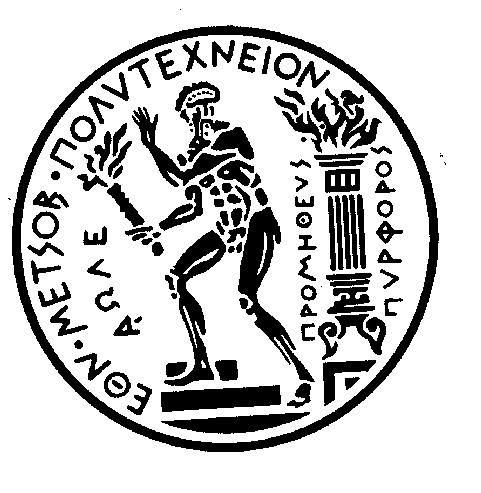Undergraduate Teaching
Environmental Technology
6th semester, Mech. Eng., NTUA
![]() Current
environmental problems , causes and sources of pollution. Air
pollution (emission limits and concentrations, law, effects on
health, primary and secondary pollutants, meteorology, atmospheric
dispersion). Indoor air quality (concentration levels, ventilation).
Air pollution control equipment. Equipment and methods for measuring air pollutant
concentrations.
Current
environmental problems , causes and sources of pollution. Air
pollution (emission limits and concentrations, law, effects on
health, primary and secondary pollutants, meteorology, atmospheric
dispersion). Indoor air quality (concentration levels, ventilation).
Air pollution control equipment. Equipment and methods for measuring air pollutant
concentrations.
The course involves optional coursework (35% weighted) using EPA's AERSCREEN software for pollutant dispersion evaluation
or using a selection of mobile measuring instruments for indoor or outdoor air quality.
Fluid Mechanics I
4th semester, Mech. Eng. NTUA
![]() Historical review,
achievements – Physics and Chemistry of fluids – Continuum Mechanics
– Kinematics – Basic laws in integral and differential form: balance
of mass, moment, moment of momentum, energy (1st and 2nd law) –
Constitutive relations – Newtonian and non- Newtonian fluids –
Applications, simplifications: equations of Euler and Bernoulli –
Equations of Navier-Stokes – Analytic solutions of Navier-Stokes
equations (laminar flow in pipes) – Irrotational flow of
incompressible fluids – Superposition of simple potential flow
fields - Similarity laws – Flow stability – Turbulent flows – The
concept of boundary layer – Laminar boundary layer of flat plate
(theory of Blasius) – Turbulent flow in pipes – Forces on moving
bodies – Moving frames of reference – Discontinuities – One
dimensional isentropic flow of compressible fluid and Laval nozzle.
Historical review,
achievements – Physics and Chemistry of fluids – Continuum Mechanics
– Kinematics – Basic laws in integral and differential form: balance
of mass, moment, moment of momentum, energy (1st and 2nd law) –
Constitutive relations – Newtonian and non- Newtonian fluids –
Applications, simplifications: equations of Euler and Bernoulli –
Equations of Navier-Stokes – Analytic solutions of Navier-Stokes
equations (laminar flow in pipes) – Irrotational flow of
incompressible fluids – Superposition of simple potential flow
fields - Similarity laws – Flow stability – Turbulent flows – The
concept of boundary layer – Laminar boundary layer of flat plate
(theory of Blasius) – Turbulent flow in pipes – Forces on moving
bodies – Moving frames of reference – Discontinuities – One
dimensional isentropic flow of compressible fluid and Laval nozzle.
Introduction to Mechanical Engineering
1st semester, Mech. Eng., NTUA
![]() Educational
background and the skills of an Engineer. Learning methods.
Presentation of the program of studies and of the laboratories of
the School. Typical examples of the activity of the laboratories.
Basic Mechanical Engineering equipment and installations from
ancient to modern times. The mechanical engineering approach to
problem solving (analysis-synthesis with the use of principles of
Physics- Mathematical and experimental simulation and principles of
economy). Lessons from successful and failed engineering
constructions. The innovative thinking and the innovator engineer.
Principles of successful oral and written communication. Principles
of professional conduct and code of ethics.
Educational
background and the skills of an Engineer. Learning methods.
Presentation of the program of studies and of the laboratories of
the School. Typical examples of the activity of the laboratories.
Basic Mechanical Engineering equipment and installations from
ancient to modern times. The mechanical engineering approach to
problem solving (analysis-synthesis with the use of principles of
Physics- Mathematical and experimental simulation and principles of
economy). Lessons from successful and failed engineering
constructions. The innovative thinking and the innovator engineer.
Principles of successful oral and written communication. Principles
of professional conduct and code of ethics.
Experimental Fluid Mechanics
5th semester, Mech. Eng., NTUA
![]() Basic
characteristics of measuring instruments. Measurement errors. Signal
digitization. Fourier analysis. Operation principles of various
measuring techniques like Hot wire anemometry, Laser Doppler
anemometry, Particle Image Velocimetry, Pitot and Pitot Static
tubes, tubes of many holes, flow rate meters, viscometers, ultra
sound, shear stress measurement, pressure measurement, flow
visualization. In the context of this course, 6 exercises take place
applying some of the above techniques.
Basic
characteristics of measuring instruments. Measurement errors. Signal
digitization. Fourier analysis. Operation principles of various
measuring techniques like Hot wire anemometry, Laser Doppler
anemometry, Particle Image Velocimetry, Pitot and Pitot Static
tubes, tubes of many holes, flow rate meters, viscometers, ultra
sound, shear stress measurement, pressure measurement, flow
visualization. In the context of this course, 6 exercises take place
applying some of the above techniques.
Multiphase Flows
9th semester, Mech. Eng., NTUA
![]() Introduction to multiphase flows: General description, categorisation and example applications;
Dispersed phase: Properties, characterisation, coupling with carrier phase, statistics of dispersed phase distribution;
Particles in carrier phase: dynamics, thermodynamics, interactions with fluid, particles and solid walls (erosion, deposition);
Carrier phase : Equations, averaging methods;
Numerical simulation: particle phase approaches (Lagrange – Euler), carrier phase equations and coupling;
Dispersion mechanisms: molecular and turbulent diffusion, numerical simulation;
Measurement methods.
Introduction to multiphase flows: General description, categorisation and example applications;
Dispersed phase: Properties, characterisation, coupling with carrier phase, statistics of dispersed phase distribution;
Particles in carrier phase: dynamics, thermodynamics, interactions with fluid, particles and solid walls (erosion, deposition);
Carrier phase : Equations, averaging methods;
Numerical simulation: particle phase approaches (Lagrange – Euler), carrier phase equations and coupling;
Dispersion mechanisms: molecular and turbulent diffusion, numerical simulation;
Measurement methods.
The course includes two mandatory course exercises involving processing of measured atmospheric particle samples and
numerical simulation of particle motion in simple fluid flow fields.
Current
environmental problems , causes and sources of pollution. Air
pollution (emission limits and concentrations, law, effects on
health, primary and secondary pollutants, meteorology, atmospheric
dispersion). Indoor air quality (concentration levels, ventilation).
Air pollution control equipment. Equipment and methods for measuring air pollutant
concentrations.
 Fluids Section, School of Mechanical Engineering
Fluids Section, School of Mechanical Engineering